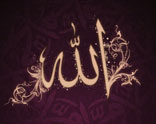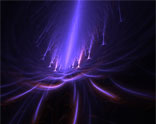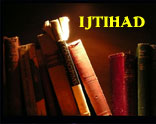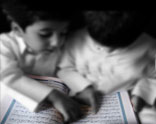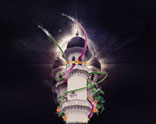Man is born with a number of axiomatic assumptions. They are instinctive. No outside instruction gave rise to them, though later may have reinforced them. This is true of both educated and uneducated individuals. For example, the axiom, "the whole is greater than the part," requires no special instruction to make that clear. Erudition, science, and philosophy are secondary results of the application of that and similar axioms. It is only when man forgets his axiomatic precognitions that he starts to doubt basic truths. Some philosophic schools deny the society of violated meanings. Faith in God is one of man's innate senses. This becomes plain if a person empties the mind of all religious or anti-religious prejudices and then opens his eyes to gaze upon the universe of creation. He finds himself at once contained within the sphere of beings in motion. He has started willy-nilly from a point he did not choose and is moving willy-nilly towards a destination he did not choose. Without his own consent or comprehension, he is part of a universal orderliness and procession of entities. Observation leads him to deduce from the manifold a connection between its orderliness and himself. He senses that behind the scenes of the world of being there reigns an invisible power which controls the course of all entities according to a will with order and accuracy. Himself, an infinitesimal particle in the vast manifold, possesses knowledge, power, and will. Hence he deduces that a knowledge, a power, and a will - though of a totally other dimension and wholly invisible - makes, preserves, and finally removes every living being without permission or agreement.
That this is an innate axiom of mind is confirmed by man's observation that there is nothing made without a maker, nothing done without a doer. Even the newborn infant, fresh from the womb, which has never before heard a sound or seen a movement, instinctively turns towards the source of a sound or movement. Likewise, practical living and experimental science assume that a cause exists for each observed effect.
The principle of causality admits of no exception. All the sciences - geology, physics, chemistry, economics, and the rest - observe phenomena to determine their causes, operative factors, interrelations, and interactions. Likewise mathematics, the most exact of the sciences, formulates theorems, adduces their proof, and draws their consequences as equations, interrelations, rules, differentials, and integrals. A scientist who arbitrarily replaces a plus with a minus in an equation, or inserts an intrusive number, confirms his own incompetence and ignorance. In fact, all human progress has been due to research uncovering causes of observed effects and adapting these natural laws for the use of man.
If we could find an instance in nature of spontaneous creation, we would then have the right to hypothesise the possibility of a similar phenomenon in other fields. But the law holds, which experimental science proves, that: "No matter or energy is ever annihilated; no new matter or energy ever emerges." We realise that in reality no autonomous entry contrary to the laws of nature is possible for any natural material or element. All our experiments, perceptions, and inferences reinforce the conclusion that there is no effect without a cause. It is therefore patent that anyone who holds otherwise is treading underfoot scientific laws, first principles, deductions of reason, and the ordinances of the Creator.
The human faculty of innate certainty about some axioms corresponds with instinct in the animal. Instinct, stripped of the limitations of its origin, is enabled to penetrate the barriers of sense and investigate the infinitesimal and the infinite, the unknown and the invisible. This limbic consciousness of axioms is akin to the orderliness of nature, and averse to human divergences, so long as it remains free of meretricious fripperies propounded by self-opinionated "philosophers" and "scientists," or the pontifications of the pious. The acceptance of axioms must guide reason, and by throwing off every material consideration or motive, cleave to the truth, the absolute and the real. This innate insight is not the prerogative of any race or culture. It knows no boundaries. It recognises no East or West. There are such limbic laws in every human being: not implanted by systems or beliefs or education or social environment, but innate. One such is a mother's love for her child.
Yet cultural and environmental factors are among later influences which bend the innate consciousness of axiomatic truths, sometimes undermining sometimes undergirding them. Persons who remain firm in the mould they were made in, true to themselves, unhindered by local customs or bourgeois conventions, retain their innate knowledge uncoloured by popular catchwords or trendy fashions, can hear the inner voice more clearly and so can tell right from wrong in actions, truth from falsehood in beliefs. Therefore atheism, which derails true human nature, is less seen in such integrated personalities. If you say to such a person: "The universe is a mere chance agglomeration, an accidental conjuncture"; even back the assertion with eloquence, with seemingly logical arguments, with philosophy; none of this will move that person. The inner voice with its instinctive, innate, limbic certainties bids them to reject all such opinions. The "demon" which led Socrates was the name by which he called what Islam calls fitrah, that innate sense man is born with.
But so-called "science" weaves a spider's web of such human concepts which traps its captives into doubt and scepticism.
The arrogant delusions of limited knowledge place glass slides of many colours before the lens of the eye of reason and inner certainty. Those who boast of this type of human learning, paint the universe in the colours of their own spectacles of "science", "knowledge", "craft", and "skill". They then consider their portrait to be reality itself. They are unable to distinguish the lens of reason from the coloured glasses of wishful fantasy.
By this it is not intended to say that a person, by perfecting his intelligence, can stand so firm that he is immune to all deviatory influences. It is intended to say that a man should not be enslaved by limited human knowledge and delusions of technological prowess. He should rather regard every new piece of learning and science as a rung on the upward ladder of human endeavour. Setting his foot firmly on each new rung, he raises himself upward towards higher things, and sets himself free from the stagnant immobility of imprisonment within four walls of current phraseology and opinion.
In Persian, we use the Arabic word fitrah, for this inner compass or guide which is inborn in every individual. Bertrand Russell's contention that fear is the seedbed of religion, denies the fact that fitrah hurries to man's aid at moments of peril. But, of course, Bertrand Russell put the cart before the horse. It is not fear that generates religion; it is religion that runs to the aid of fear. When a person is under pressure from problems and difficulties; when all material factors fail; when every possibility in life has been exhausted; when the sea of troubles is so overwhelming that death is faced; fitrah's inner voice directs the sufferer to a non-material refuge. Grasping onto the One, Whose supreme power is above all powers, the sinking person finds that beneficent Being able to do exceedingly more than we ask or think. Taking the human's hand, He gives salvation from the mortal danger, the deadly peril. The experience encourages the person to turn with all his being, with heart and soul, to this same Providence in every time of need or of thanksgiving.
Yes, indeed, it is the consciousness of the perils of being alone in the world that kindles the inner light of a person and awakens awareness, leading to faith in the Lord.
The inner light radiates a sense of power and might in its hermit-cell in the human heart. Even materialists; indifferent in their days of glory, prominence, and domination; and blind to the boundless power of God, once faced with difficulty, defeat, and disaster: straightway return to the Deity they had denied while they dwelt in the tents of wickedness and strayed from the right path. In their trouble, with heart and soul, they seek the origin of all being, the source of all power.
So atheism and polytheism, in all their forms, from raw idolatry and crude animism to materialist progressivism, all result from disregard of fitrah. It is in these areas that the light of divine guidance, the whisper of direction, is required to lend strength and enlightenment to fitrah and to reason, to preserve them from error and to rescue them from stagnation in the haunts of fear.
The call of the prophets accompanies this inner restlessness which is fitrah's yearning for God. The first persons who heeded the prophets' call were people of enlightened heart and of a living fitrah. In opposition to the prophets were persons inflated by their own conceits, by their boasted knowledge and vaunted intelligence, reliant on their own wealth or position. As one scientist said, "In ethics also, the law of supply and demand exists." If the demand for religion was not an integral part of the inmost being of humans, the supply offered by the prophets would go unsought. We observe that the prophets' supply does not remain unpatronised by customers. In fact it enjoys the custom of innumerable adherents. This is evidence that desire for faith is of the essence of humanity. Furthermore, under the prophets' teachings is subsumed the worship of the One. Their world did not return unto them void.
Idolatry; worship of the sun, moon, and stars, or of other images; though primitive, crude, and undeveloped forms of man's upward aspirations, are also evidence in their own distorted fashion of the heart's need for a deity, something to be worshipped. These early stages were like the early stages of science when it dealt in magical hypotheses; untested and untried fruits of the imagination; yet nonetheless, steps on the ladder up to the One Who is the Essence of Being, the Origin of All Being. They were mirages, allowed by God, to draw the heart towards the cooling streams of the refreshing Grace of the One, the totally Other. However erroneous and external, they appealed to man's inmost being wherein dwelt the innate restlessness that only finds rest in pure monotheism.
In the past century - the 14th of the Muslim era, which ends in 1979 AD - religious experience has been a subject of scrutiny for the learned. Discoveries have been made which, because of their importance, are still subjunctive, debatable points for research and discussion, for weighing and sifting. Yet they put valuable and profitable results within our grasp. Studies of comparative religions, of the history of religion, aided by sociology, archaeology, palaeontology, anthropology, psychology and the like, pour the religious instinct and feeling into a new crucible in which it is separated into its different components so that its elements can be analysed.
Freud was the pioneer of the exploration into the human conscious, subconscious, and other elements of mental and emotional performance.
Adler and Jung followed. They penetrated into the inner depths of the human mental and emotional make-up. They investigated a whole new world. In it they found capabilities, types of perception, insight, cognition, motivation, occult fantasy (some shaped by folk-inheritance), choice, and decision-making. These all seemed primary, innate, and limbic. Among such faculties, not secondarily developed by reason, they placed the religious sense. They opened it up as a domain for further scientific investigation, seeking the key to its enigma.
These new scientific advances have convinced the savants of every school that the religious sense is of the essence of humanity; innate, limbic, primal, and basic. Without it, the human is not human. It is not exchangeable with any other element. It is of the quiddity of natural conviction and intellectual insight. Its source lies in the depths of the spirit. It makes the person aware of himself. It informs him of his own existence. Among other innate senses in the same category are:
1- TRUTH. The impulse to seek for hidden treasure, for accuracy and righteousness; the sense which has led the thoughts of man since the day of his first appearance on earth to study and research into the myriad problems of the unknown and the obscure. It is this which has brought science and industry into being. The difficulties and hardships which obstructed the path of scientific researchers, inventors, and discoverers in penetrating the veil of obscurity that cloaks the hidden secrets of the world, were only faced because this instinct urged them on to successful conquest of uncharted territories of knowledge.
2- GOODNESS. The sense of goodness is the abode of virtues, duties, divine revelation, righteousness, justice, and philanthropy. This innate instinct impels man to desire a pure disposition. It repels and abhors impurity.
3- BEAUTY. The sense of beauty inspires taste, appreciation, art and embellishment.
To these three we must add:
4- THE RELIGIOUS SENSE. The instinct for the luminous, the holy, something to be worshipped; shares the basis and independence of the other three.
The concept of God answers human needs of every type. Some of these needs are those of reason; some are not.
Reason seeks God by the road of orderliness and thought.
Instinct (the religious sense) seeks God by the road of love. It looks for a relationship with Him.
Proof of God's existence, like that which was offered by the philosophical systems of Descartes and St. Thomas Aquinas, appeal to man's reason. Modern science and philosophy will accept as proof only those capable of being tested by experiment.
Mystics, like Pascal, respond to the religious sense along the channels of the innate impulses and the inner witnesses. Pascal writes: "Of God's existence, man's heart has proofs his brain wots not of."1
Will Durant: "Religion is a natural matter, born directly of our instinctive needs and feelings."
Dr. Alexis Carrel wrote: "The mystic sense is the stirring deep within us of a basic instinct. Man, just as he needs water, so likewise needs God."
In the 1920's, Dr. Rudolf Otto affirmed that the elements of reason are paralleled by the elements of fitrah. The two, he said, are partners mutually assisting each other. All the attributes of God (like Omnipotence, Holiness, Sovereignty) must be understood as separate entities. Thus "Holiness" is an independent concept. It is not the result of any other idea. It is not to be reckoned the same as any other concept of the human being, whether a concept of reason, or of instinct.
We live in what we call "the Space Age". We have added the fourth dimension of outer space to the three terrestrial dimensions of length, breadth, and depth. So also this age adds to the three basic concepts of "Truth, Goodness, and Beauty"; "Holiness", the fourth dimension of the human soul. It is possible that this fourth dimension is the foundation of the other three. The fact that in every age a minority has propagated materialistic ideas in no way invalidates the claim of the religious sense as limbic. Materialist atheism is a speciality of a small, though vocal minority. They are an exception to the rule incarnated in the vast majority of mankind. Metaphysical views are natural. And there are exceptions to every rule.
In history the first sceptical school of thought arose near the end of the 7th century BC. Its protagonists were Thales (622-560 BC); Heraclitus (530-470 BC), and his near contemporary, Democritus. One of the most renowned of them all was Epicurus in the middle of the 4th century BC.
Yet even these thinkers cannot be ascribed with totally materialist views. In his History of Philosophy, a learned scientist writes that Thales held that material changes are the result of spiritual impulse; that Democritus was no materialist but convinced of the existence of spirit.
It was in the 17th century after Christ that materialism began to make progress among thinkers. Even so, there are contradictory verdicts. Jean-Jacques Rousseau, for instance, is by some writers called a materialist and by others a God-fearing man. It is true that he criticised the Church. Perhaps it is because of that that his adversaries accused him of "materialism".
The Egyptian writer, Farid Wajdi, in his book, Da'iratu'l-Ma'arif, writes that Rousseau said:
"As I observe events which show natural forces at work, and scrutinise the way in which one cause influences another, one result reacts with transforming power upon another, it grows increasingly clear to me that the Prime Cause must be beneficent and benevolent. I have become convinced that His Will set existence in motion, and raised life out of dead things. You ask me where He is. I reply, 'In the firmament which He set revolving, in the stars which shed their light on us, in me, in that lamb grazing, that bird flying, that stone lying on the ground, that tree's leaf blown hither and thither by the wind - everywhere in everything.' (Do these ideas not spring from reason? Whence the orderliness we observe? Blind chance? An accidental agglomeration? Let others do as they will. For myself, I cannot observe this sovereign orderliness without inferring that a Supreme Wisdom ordained it. How could dead matter produce life? How could blind accident create these smoothly- functioning, coordinated phenomena? How could a brainless wonder create what is intelligent and intelligible?)"
* Knowing God, Chapter One B. Sayyid Mujtaba Musavi Lari. Translated by: F.J. Goulding. Published by the Foundation of Islamic Cultural Propagation in the World. An effort of the Ahlul Bayt Digital Islamic Library Project team.
1- Rise of Wisdom in Europe, v.2, p. 18.


